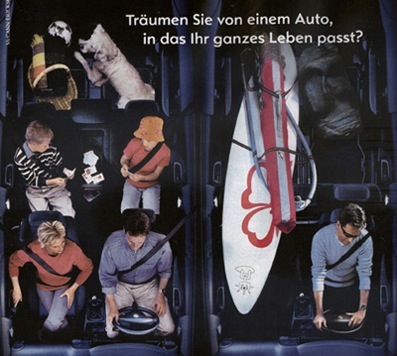|
|
|
| Which of our four seasons are you most looking forward to? | |
This discussion of creating questions in German is based on the analysis of main clauses found at www.dartmouth.edu/~deutsch/Grammatik/WordOrder/MainClauses.html.
Note: The following description of German word order is conceptual in nature. Those who would prefer to follow a more mechanical - but ultimately less complete - set of rules concerning word order would be better served by linking to these prescriptive instructions for German word order. Both sites overlap considerably.
In English, there are two basic forms of question: polar and non-polar:
I. Polar questions, also called yes-or-no questions, i.e. questions that can be answered simply in the affirmative or negative. These questions normally invert the subject and verb:
| "His name is Ralph." → "Is his name Ralph?" |
| "You are sober enough to drive." → "Are you sober enough to drive?" |
| "That is what you're wearing tonight." → "Is that what you're wearing tonight?" |
| "She has left the house." → "Has she left the house?" |
| "You can do it." → "Can you do it?" |
| "I should lose weight." → "Should I lose weight?" |
-
I.a. The above examples employ an "auxiliary verb" (sometimes called a "helping verb"): "to be", "to have," or modal auxiliaries (in the examples, "can" and "should"). In the case on a non-auxiliary, the inverted verb is the conjugated form of "to do", with the non-auxiliary taking on the infinitive form (without "to"). Note that the conjugated form of "to do" not only agrees with the subject, but it takes on the tense, as well (except of course with the future tense, which is formed by the modal "will"):
"He knows the answer." → "Does he know the answer?" "She plays the saxophone." → "Does she play the saxophone?" "They went fishing." "→ "Did they go fishing?" "He will pay me back tomorrow." "→ "Will he pay me back tomorrow?" I.b. This word order can also be used to construct an alternative question, which offers a choice:
"You ordered the lamb or the chicken." → "Did you order the lamb or the chicken?" I.c. Tag questions append a word or phrase to a declarative sentence, asking for affirmation:
"It's hot, isn't it?" "You wanted me to say that, didn't you?" I.d. In spoken language, the intonation pattern can also turn a declaration into a question:
"You're going to wear that to the opera?" "He expects me to pay for his ticket?" I.e. Polite requests can be couched in questions, often in the subjunctive:
"Would you scratch my back?" "Could you help me with the dishes?" I.f. Note that this inverted order can be used in substitution for "if" in a dependent clause, usually with the verb in the subjunctive. Here it does not form a question:
"Had I known that, I would have said something." "Were she a little faster, she could have caught the ball."
II. Non-polar questions, which call for more specific information, begin with an interrogative word such as what, when, where, who, why, etc.:
-
II.a. If the interrogative word is the grammatical subject of the question, the word order is not inverted:
"Who was that lady I saw you with last night?" "What is the matter?" II.b. If the interrogative word has some other grammatical function, the word order is inverted, with the conjugated auxiliary verb in the second position, followed by the subject:
"When does the train arrive?" "Why do you want to do that?" "What did your boss say?" II.c. If the interrogative word is part of a prepositional phrase, the whole phrase occupies the first position, followed by inverted word order:
"To whom do you wish to speak?" "At what time is the concert supposed to begin?" "In which house do they live?"
|
|
 |
| Do you dream of a car that your whole life will fit into? | |
I. Polar (Yes-or-No) Questions: In the case of yes-or-no questions, the first position is empty, and the subject follows the finite verb.1
I.a. In contrast to English, German does not require an "auxiliary verb" to construct the conversion:
| Sie sieht müde aus. → Sieht sie müde aus? |
| She looks tired → Does she look tired? |
|
Es gibt etwas zu essen. → Gibt es etwas zu essen? |
| There is something to eat → Is there something to eat? |
|
Du fährst gern. → Fährst du gern? |
| You like to drive. → Do you like to drive? |
|
Du hast alles dabei. → Hast du alles dabei? |
| You have everything with you. → Do you have everything with you? |
|
Sie sind verrückt! → Sind Sie verrückt? |
| You're nuts! → Are you nuts? |
|
Ihr habt gut geschlafen. → Habt ihr gut geschlafen? |
| Y'all slept well. → Did y'all sleep well? |
|
Er wird das bald sagen können. → Wird er das bald sagen können? |
| He'll be able to say that soon. → Will he be able to say that soon? |
|
Wir sollen ihn nach Hause tragen. → Sollen wir ihn nach Hause tragen? |
| We should carry him home. → Should we carry him home? |
|
|
|
| Are emotions more important to you than conventions? | |
- Tag questions tend to be colloquial, and the tag itself ("nicht wahr?") can often be a regionalism: "gell?"; "ne?"; "nitt?"; "nö?" "wat?"; "wie?"
I.b. This word order can also be used to construct an alternative question, which offers a choice:
| "Haben Sie Bier oder Wein bestellt?" "Did you order beer or wine?" |
I.c. Tag questions are particularly common in German:
| Du hast das schon gewusst, nicht wahr? You already knew that, didn't you? |
| Der Film war toll, nicht? The movie was great, wasn't it? |
| Die Antwort war richtig, oder? That answer was right, wasn't it? |
I.d. As in English, requests can be more politely couched in questions, often in the subjunctive:
| Würdest du gefälligst den Mund halten? Would you kindly shut up? |
| Könnten Sie mir einen Gefallen tun? Could you do me a favor? |
|
|
 |
| Do you suffer from recurring depressions? | |
|
|
|
| On which will you decide? | |
II. Non-Polar (Information) Questions:
With questions intended to elicit specific information, on the other hand, the first position contains an interrogative word or phrase such as
wann, warum, was für, welch-, wer, wen, wem, wessen, wie,
wo, wohin, woher, wie viel (or wieviel),
um wieviel Uhr, in welcher Straße, etc.
Note that this positioning can represent "normal" word order if the interrogative word is
the nominative subject, such is always the case with wer and is possible with was or was für.
In most cases, however, when the interrogative word or phrase functions as an object or adverb,
its occupation of the first position results in inverted order:
| Wer hat den Hut gestohlen? Who stole the hat? |
| Wer soll das Geschirr abspülen? Who's supposed to do the dishes? |
| Was für ein Mensch bist du? What kind of person are you? |
| Was bedeutet dieses Wort? What does this word mean? |
| Wen hast du heute gesehen? Whom did you see today? |
| Wem hast du das gesagt? Who did you tell that to? |
| Wessen Hut trägt meine Frau? Whose hat is my wife wearing? |
| Wann beginnt der Film? When does the movie start? |
| Um wieviel Uhr stehst du auf? What time are you getting up? |
| Wann dürfen wir nach Hause? When are were allowed go home? |
| Wie alt ist Ihr Hund? How old is your dog? |
| Was willst du heute Abend machen? What do you want to do tonight? |
| Wo liegt Hanover, New Hampshire? Where is Hanover, New Hampshire, located? |
| Wohin sollen wir jetzt gehen? Where should go now? |
| Zu welcher Zeit lebte Leibniz? At what time did Leibniz live? |
| In welcher Straße wohnst du? On what street do you live? |
|
|
|
| If you could kiss only one person in your life, who would it be? | |
III. Indirect Questions:
When a someone restates a question, resulting in what is often called an indirect question, the interrogative word or phrase
becomes a subordinate conjunction. If the question was of the polar (yes-or-no) variety, the conjunction is ob:
| "Weißt du die Antwort?" | Ich habe gefragt, ob du die Antwort weißt. | I asked if you know the answer. |
"Wann kommt der Bus?" |
Sie will wissen, wann der Bus kommt. | She wants to know when the bus is coming. |
"Warum will er mit uns sprechen?" |
Es ist mir nicht klar, warum er mit uns sprechen will. | It's not clear to me why he wants to speak with us. |
When simply repeating a question that wasn't heard or responded to the first time, Germans often just give the dependent clause:
| Sprecher 1: "Wohnt er bei seinen Eltern?" | Sprecher 2: "Wie bitte?" | Sprecher 1: "Ob er bei seinen Eltern wohnt." |
1 Note that this positioning of the verb is also found in the "Sie"-form of the imperative. It additionally appears as a substitute for the word "wenn" in a dependent clause, usually with the verb in the subjunctive):
| Hätte ich gewusst, wer ihr Vater ist, hätte ich etwas anderes gesagt. | Had I known who her father is, I would have said something else. | Regnete es, gingen wir nach Hause. | Were it to rain, we'd go home. |
